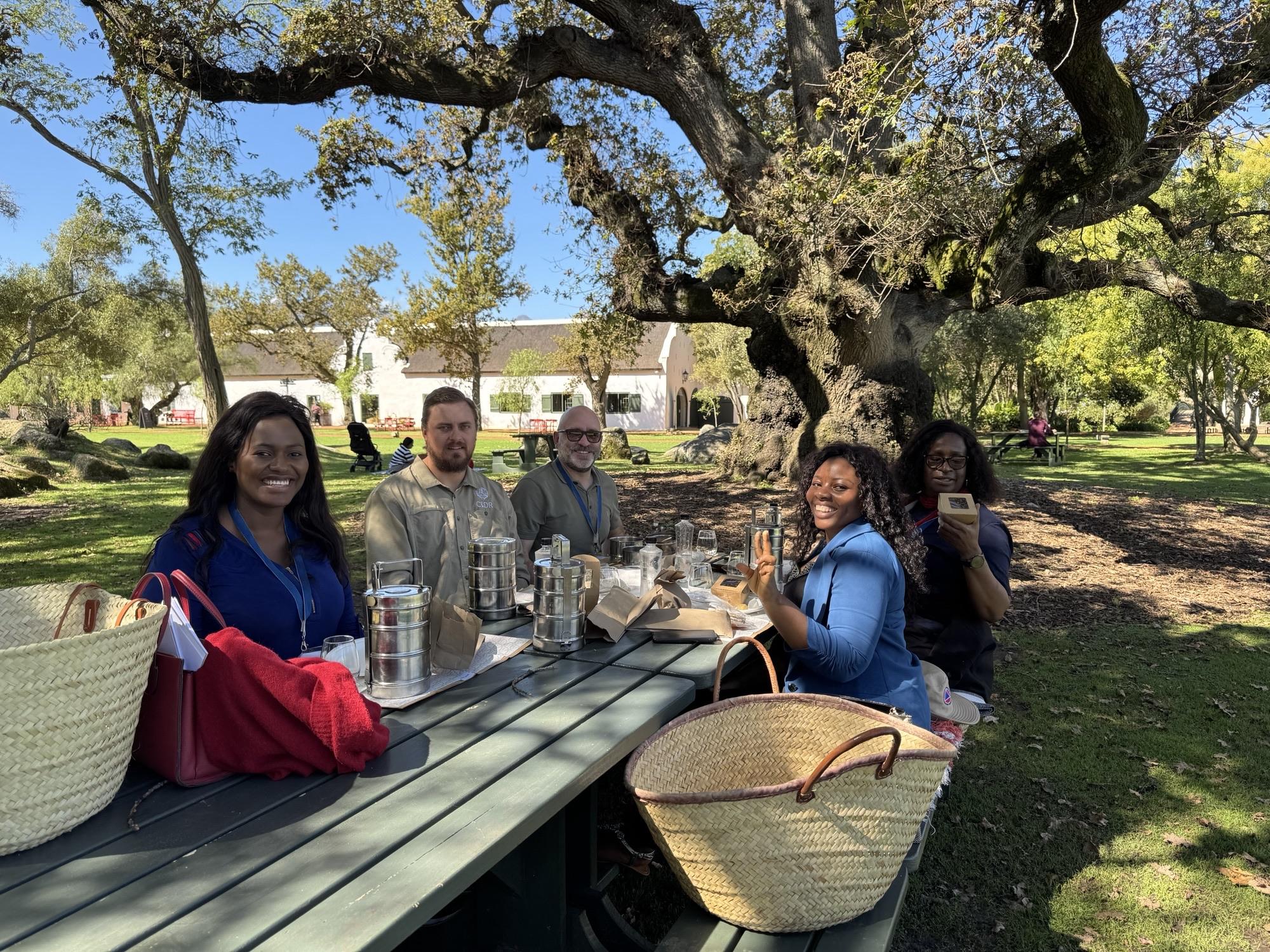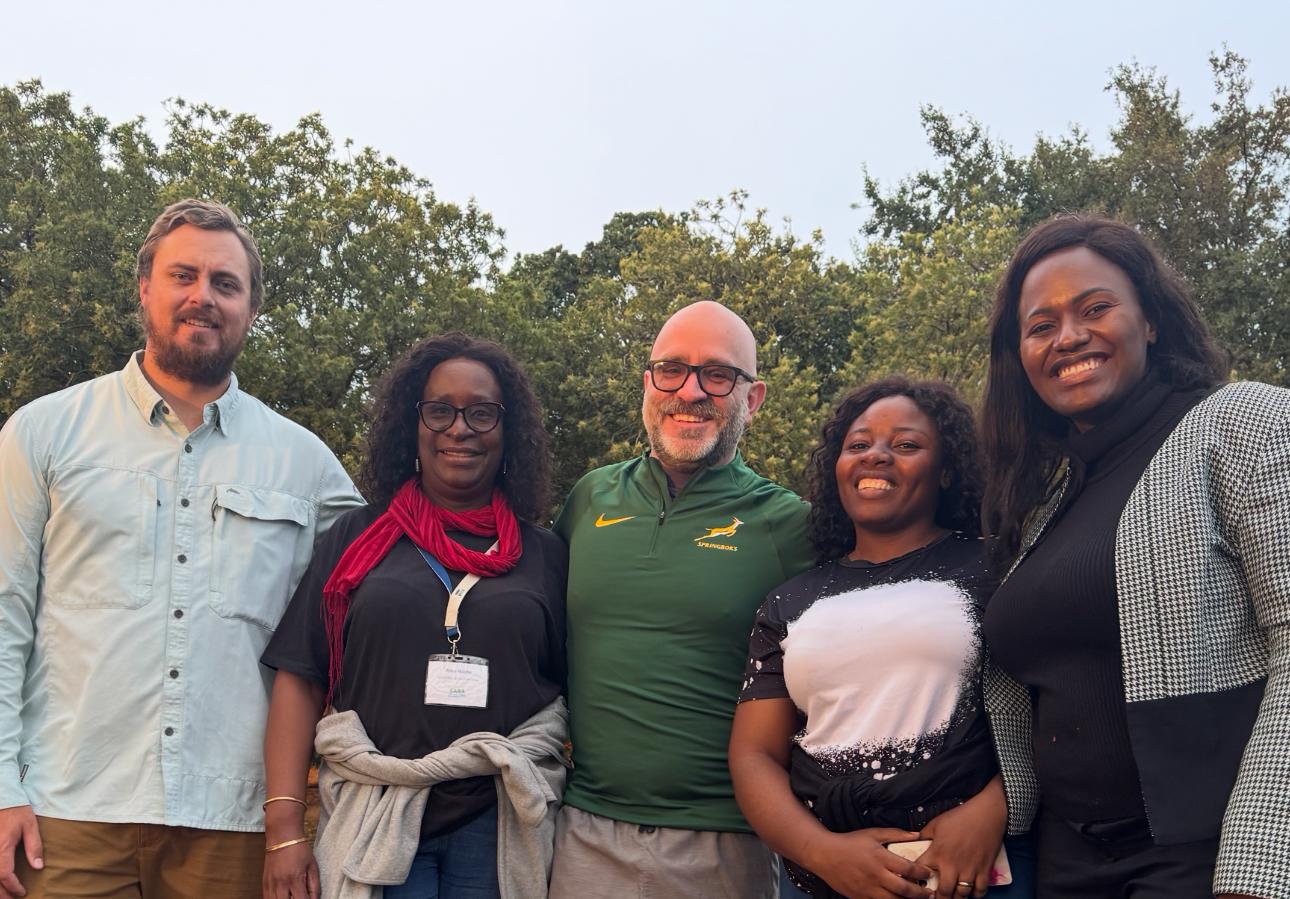Resilience Rewired: Reimagining futures for southern Africa
In early April, under the golden canopy of Stellenbosch’s autumn sun, a global gathering quietly sowed the seeds of what might become a watershed moment in rethinking humanitarian resilience.
Dr. Reggie Ferreira and Tim Davidson, representing the Disaster Resilience Leadership Academy, journeyed to South Africa to join their team for the first of several week-long workshops and reflections at the Southern Resilience Academy (SARA)—a growing hub for transformative resilience thinking housed at Stellenbosch University. There they joined their colleagues Alice Ncube and Chikondi Chabvuta, the team leads, both of whom were prior participants in previous rounds of SARA. They were also joined in person by Sonita Lum, a new team member, and Karl Deering, also a prior SARA team member who participated virtually for this convening. Their visit, supported by the Global Resilience Partnership (GRP), wasn’t just another academic stop. It was a deliberate step in building a bold, three-year effort to reshape how humanitarian organizations—starting with CARE International—conceptualize, measure, and sustain resilience in Southern Africa with “Good Practices for Resilience”.
From Observation to Transformation: A Different Kind of Workshop
What unfolded at SARA was not your typical workshop. Instead of PowerPoint overload and formal panels, the convening was alive with participatory dialogue, collaborative mapping, and radical imagination.
In one corner of a garden courtyard, groups huddled around flipcharts, debating how resilience is measured not by checklists but by lived realities—especially those of women, youth, and indigenous communities. Ferreira, known for his sharp global lens and conceptual clarity, stepped into this creative current with purpose. Alongside Davidson, whose gift for data systems and facilitation helped ground the discussions, they contributed to their working group’s shared vision: Resilience Rewired—a movement to shift resilience practices away from extractive interventions and toward locally sustained, gender-aware, and policy-informed solutions.
Building Bridges Across Sectors and Borders
What Reggie and Tim brought to the table—and what they’ll carry forward—was more than academic insight. It was the blueprint for a team-led transformation process grounded in CARE’s deep archives of community-based resilience work across Malawi, Zambia, Zimbabwe, Mozambique, and potentially Ethiopia.
Over the next three years, their initiative will focus on three core pillars:
- Learning from the Past: Mining CARE’s data on resilience interventions, especially around gender and indigenous knowledge, to identify “good practices” that worked—and those that didn’t.
- Making Meaning Through Participation: Using Group Concept Mapping (GCM) and interviews with CARE staff, communities, and local leaders to co-produce a new understanding of resilience grounded in lived experience.
- Turning Insight into Influence: Crafting policy briefs, storytelling outputs (like podcasts and visual media), and training materials to influence local and global policy—from national governments to spaces like COP and the Sendai Framework.
A Coalition for Change: People and Institutions Powering the Work
At the heart of this initiative is a dynamic, interdisciplinary team—drawing on diverse strengths in data analysis, storytelling, stakeholder engagement, and policy advocacy. The team includes experts, with each bringing unique capabilities to ensure that the work is inclusive, evidence-based, and action-oriented. Their efforts are supported by a strong network of institutional partners: Stellenbosch University, home to the Southern Resilience Academy; the University of the Free State, which contributes regional academic expertise; the Global Resilience Partnership (GRP), offering global policy linkages and strategic visibility; CARE International, whose rich field data anchors the project; and the Disaster Resilience Leadership Academy at Tulane School of Social Work, which provides intellectual leadership and research infrastructure. Together, this coalition bridges local knowledge with global influence, aiming to create a lasting impact on resilience policy and practice across Southern Africa and the Global South.
Looking Ahead: From Imagination to Implementation
Back at the workshop in Stellenbosch, someone asked the group a deceptively simple question: “How do we know we’ve created impact?”
The answer, everyone agreed, was not found in metrics alone—but in stories, in relationships, and in the subtle shifts of thought that ripple out over time. Reggie and Tim’s journey—and the work of the Resilience Rewired team—is only beginning. But already, seeds have been planted: in ministerial offices, community halls, WhatsApp groups, and university corridors.
Their message is clear: resilience is not a deliverable. It’s a dialogue—one that must be inclusive, iterative, and deeply local.


